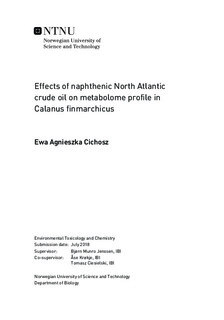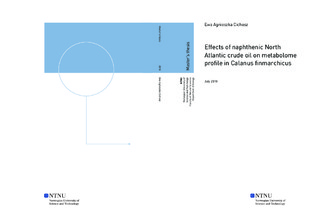| dc.description.abstract | Calanus finmarchicus is an ecologically important species in the North, Norwegian and Barents seas where marine biota is exposed to contaminants discharges due to oil and gas production and transportation. In this experiment, copepods Calanus finmarchicus were exposed to the water-accommodated fraction (WAF) of North Atlantic crude oil in laboratory conditions. The exposure set consisted of four different time exposures where animals where sampled after 24, 48, 72 and 96 hours. The adverse effects were investigated through metabolite profile changes using proton nuclear magnetic resonance (1H NMR) spectroscopy technique. The results indicate a potential adverse effect of oil pollution on this crucial marine type of zooplankton which may be of great importance for animals of the next trophic levels and ecosystem functioning.
Based on previous findings it was possible to perform metabolome profiling analysis which indicates changes in amino acids, their precursors and other metabolites. Changes in 12 out of 27 metabolites appear to be concurrent response to oil exposure and starvation. However, changes in concentrations of 4 of the presented metabolites seem to be induced by the oil exposure which can be observed through contradictory tendency of the metabolites concentrations after the oil exposure compared to the control samples. From these results, malonate shows the biggest changes in concentration after the oil exposure which is up to 113% increase after 96h exposure compared to the corresponding control of 96h. This finding suggests that malonate may be used as a possible biomarker of oil exposure in Calanus finmarchicu what can be essential for both, monitoring and decision-making processes in situations of oil spill. | |

